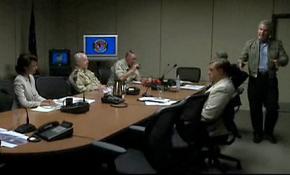What does W. stand for?
says that W. is a lot of laughs at the expense of people we hate--but ultimately, George Bush deserves to be judged more harshly.
I ALWAYS wondered about one opinion poll that came out after George W. Bush's re-election victory in 2004. The poll found that a majority of people thought Bush was the candidate that they'd rather go out and have a beer with.
Really? Peevish, smirking, sanctimonious, over-privileged George Bush?
Now, yes, I remember: Bush's opponent in 2004 was the humorless and plenty-arrogant-himself John Kerry. Fair enough.
But still. A beer with George Bush?
I've now seen the two-hour movie about Bush, W., directed by Oliver Stone, and I still don't see the attraction. But the thing is, I don't think Oliver Stone does either. And I think that's why his film seems a little aimless.
W. is an entertaining movie, for sure--at least for anyone who's spent the last eight years hating the Bush regime. The whole cast of characters--Cheney, Rove, Rumsfeld, Wolfowitz--is presented in all their villainy. There are even some fine moments when the film crystallizes the political questions at play during the Bush presidency in a very striking way.

But Stone obviously wanted to make a movie that also shows what makes George Bush tick. Only he can't really figure it out. So the Dubya onscreen remains kind of a mystery--a platitude-spouting cartoon character, but set in a live-action movie, interacting with real people who typically can't quite figure out if this guy is for real.
It's as if Stone couldn't decide whether W. should be a tragedy, a political satire or a wacky TV sit-com, featuring a space alien secretly living among us, who improbably becomes president.
I DON'T want to be too hard on W., because I enjoyed it. If it had stuck to making fun of the Bush regime, it would have been a blast, even without Will Ferrell in the title role.
The highlights of the movie are the meetings in the Bush White House, where you get to savor the wicked and uncanny impersonations of people you despise: Dick Cheney (Richard Dreyfuss) manipulating Bush with ease, but barely able to cover up his contempt; Condoleezza Rice (Thandie Newton) scrambling to read her bosses' mind so she can present him with what he wants to hear; Donald Rumsfeld (Scott Glenn) rambling on about his half-baked theories.
Stone also has fun with Bush's bumbling encounters with public speaking. All the famous quotes are here--"misunderestimated," "the decider," "is our children learning"--but Stone takes them out of their original context and sprinkles them into private conversations or other settings. The effect is to emphasize how Bush seems to operate in a separate world--one of such privilege that the rules of language bend to him.
There are also some great moments that explore the political questions at the core of the central event of the Bush presidency--the "war on terror" and the Bush Doctrine.
One of Stone's talents is his skill in bringing the tools of moviemaking to bear on a historical event or political debate. Thus, in W., there's a meeting in the White House Situation Room where Cheney, flanked by Rumsfeld and Wolfowitz, makes the case for pre-emptive war to reshape the Middle East to the liking of U.S. imperial interests--chief among them, of course, control of Middle East oil.
The scene is an indictment of every neoconservative who ever claimed to be motivated by democracy or freedom or even the security of Americans. Cheney concludes that the prize is nothing less than "[e]mpire, real empire. Nobody will ever fuck with us again in our lifetime."
In putting this discussion onscreen, though, Stone has to bend the facts. Colin Powell is turned into a hero--the one man to resist the seductions of the neocon dream of world domination. Likewise, George Bush Sr. is seen as wizened and compassionate, which will come as a surprise to anyone who lived through his foul years in the White House.
These distortions loom larger because the issues that Stone takes up--the rise of the neocons and the drive to war in Iraq--seem dated, even though they only took place a few years ago.
But the truth is that next week's election will almost certainly install a Democratic president in the Oval Office--one who was endorsed by Powell and who applauded Bush Sr.'s handling of foreign policy. W.'s whitewashing of Powell and "Poppy" Bush--even if it's done to more effectively take down Cheney and Bush Jr.--is based on illusions about the "good cops" of U.S. imperialism that will be more important in the years to come than the case against the neocons.
Still, I'd take these parts of the movie, whatever their flaws, over the long stretches that focus on Bush's private life.
We're apparently supposed to learn about the demons that drive Dubya in these segments, but the movie never goes beyond the oldest clichés in the book--above all, Bush's desperate and hopeless quest to win his father's approval. As Bush Sr., James Cromwell spends a lot of time sighing, averting his eyes, looking dejected or solemnly declaring stuff like, "You disappoint me Junior. You deeply disappoint me."
In the end, when the invasion of Iraq goes dreadfully wrong, Bush is incapable of comprehending his own part in the disaster. Pacing around his White House bedroom, he tells Laura, "All I wanted to do is make the world a better place."
Yeah, right.
W. is a lot of laughs at the expense of people we hate, and who we'll weep with joy to see leave the public stage in a few month's time. But George Bush deserves to be judged a lot more harshly than that.


